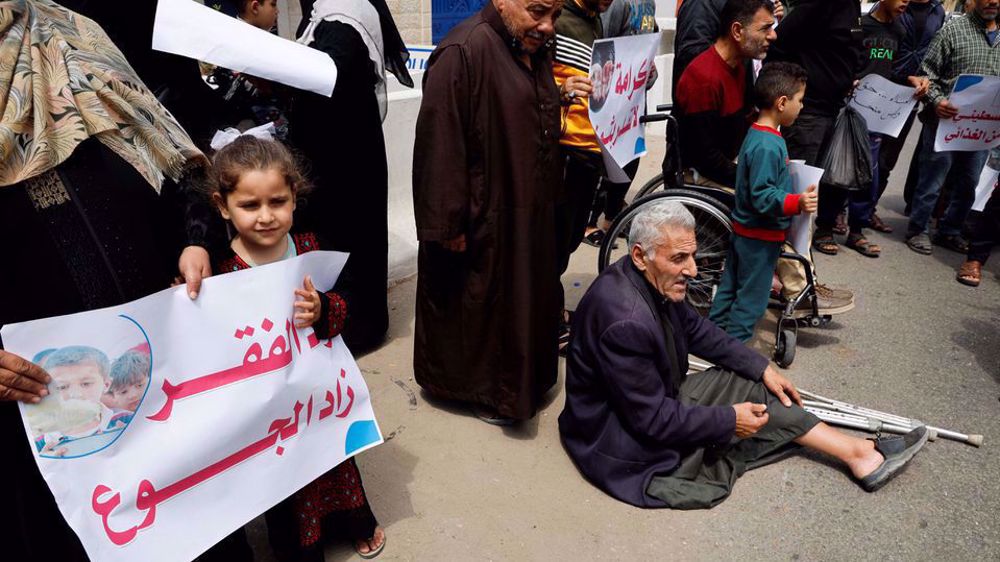AhlulBayt News Agency: The World Food Programme (WFP) of the United Nations says it will suspend food aid to a large number of impoverished Palestinians in the besieged Gaza Strip and the occupied West Bank due to funding shortages.
Samer Abdeljaber, the WFP's senior official for Palestinian territories said on Sunday that the agency was set to suspend food aid to over 200,000 Palestinians from next month due to a "severe" shortage of funds.
"In light of the severe funding shortages, WFP is forced to make painful choices to stretch the limited resources," Abdeljaber said. "WFP would have to start suspending assistance to over 200,000 people, which is 60 percent of its current caseload, from June."
"WFP understands the implications of this unavoidable and hard decision on hundreds of thousands of people who also depend on food assistance for their most basic needs," stated Abdeljaber.
The UN agency will continue its aid to 140,000 people in Gaza and the West Bank, said Abdeljaber, who added the suspension decision was taken to save those who are at the highest risk of not being able to afford food.
Unless funding is received, WFP will be forced to suspend food and cash assistance entirely by August, he said.
Chanting "No to Hunger," dozens of Palestinians staged a protest outside the WFP offices in the besieged Gaza City to protest the decision.
The United Nations agency offers impoverished Palestinians both monthly vouchers with a value of $10.30 per person and food baskets. Both programs will be affected.
"The voucher is life, the message they sent us equals death since there is no other source of income," said Faraj Al-Masri, a father of two, whose family gets vouchers worth $41.20 per month.
In Jabalia, in the northern Gaza Strip, Jamalat El-Dabour said they will "starve to death" as her husband was sick and unemployed.
The most impacted families are in Gaza, where food insecurity and poverty are the highest, and in the West Bank.
The Gaza Strip has been under an Israeli blockade since June 2007. The blockade has caused a decline in the standard of living as well as unprecedented levels of unemployment and unrelenting poverty.
Israel has launched several military offensives on the besieged territory since 2008, making the situation even worse.
The recent cuts were decided upon after a gradual reduction in donations over the past years.
The UN agencies in the past blamed the funding shortages on cuts by the United States and other countries in aid to Palestinians.
In 2018, the administration of president Donald Trump announced it was cutting all US funding for the main UN program for Palestinian refugees, affecting five million people who relied on its schools, healthcare, and social services.
UNRWA not only serves Palestinians in the occupied territories but also in Jordan, Syria and Lebanon. European and Arab countries have pledged to protect the agency and Germany promised a significant increase in financial backing.
The announcement had been anticipated both by senior officials at UNRWA and other Washington insiders, leading to warnings it may further destabilize the Middle East.
/129
Samer Abdeljaber, the WFP's senior official for Palestinian territories said on Sunday that the agency was set to suspend food aid to over 200,000 Palestinians from next month due to a "severe" shortage of funds.
"In light of the severe funding shortages, WFP is forced to make painful choices to stretch the limited resources," Abdeljaber said. "WFP would have to start suspending assistance to over 200,000 people, which is 60 percent of its current caseload, from June."
"WFP understands the implications of this unavoidable and hard decision on hundreds of thousands of people who also depend on food assistance for their most basic needs," stated Abdeljaber.
The UN agency will continue its aid to 140,000 people in Gaza and the West Bank, said Abdeljaber, who added the suspension decision was taken to save those who are at the highest risk of not being able to afford food.
Unless funding is received, WFP will be forced to suspend food and cash assistance entirely by August, he said.
Chanting "No to Hunger," dozens of Palestinians staged a protest outside the WFP offices in the besieged Gaza City to protest the decision.
The United Nations agency offers impoverished Palestinians both monthly vouchers with a value of $10.30 per person and food baskets. Both programs will be affected.
"The voucher is life, the message they sent us equals death since there is no other source of income," said Faraj Al-Masri, a father of two, whose family gets vouchers worth $41.20 per month.
In Jabalia, in the northern Gaza Strip, Jamalat El-Dabour said they will "starve to death" as her husband was sick and unemployed.
The most impacted families are in Gaza, where food insecurity and poverty are the highest, and in the West Bank.
The Gaza Strip has been under an Israeli blockade since June 2007. The blockade has caused a decline in the standard of living as well as unprecedented levels of unemployment and unrelenting poverty.
Israel has launched several military offensives on the besieged territory since 2008, making the situation even worse.
The recent cuts were decided upon after a gradual reduction in donations over the past years.
The UN agencies in the past blamed the funding shortages on cuts by the United States and other countries in aid to Palestinians.
In 2018, the administration of president Donald Trump announced it was cutting all US funding for the main UN program for Palestinian refugees, affecting five million people who relied on its schools, healthcare, and social services.
UNRWA not only serves Palestinians in the occupied territories but also in Jordan, Syria and Lebanon. European and Arab countries have pledged to protect the agency and Germany promised a significant increase in financial backing.
The announcement had been anticipated both by senior officials at UNRWA and other Washington insiders, leading to warnings it may further destabilize the Middle East.
/129

